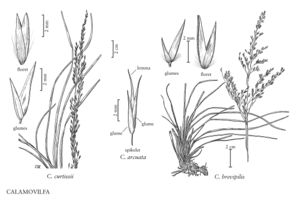Difference between revisions of "Calamovilfa curtissii"
FNA>Volume Importer |
imported>Volume Importer |
||
| (5 intermediate revisions by 2 users not shown) | |||
| Line 4: | Line 4: | ||
|publications= | |publications= | ||
|common_names=Florida sandreed | |common_names=Florida sandreed | ||
| + | |special_status={{Treatment/ID/Special_status | ||
| + | |code=E | ||
| + | |label=Endemic | ||
| + | }} | ||
|basionyms= | |basionyms= | ||
|synonyms= | |synonyms= | ||
| Line 26: | Line 30: | ||
-->{{#Taxon: | -->{{#Taxon: | ||
name=Calamovilfa curtissii | name=Calamovilfa curtissii | ||
| − | |||
|authority=(Vasey) Scribn. | |authority=(Vasey) Scribn. | ||
|rank=species | |rank=species | ||
| Line 33: | Line 36: | ||
|basionyms= | |basionyms= | ||
|family=Poaceae | |family=Poaceae | ||
| + | |illustrator=Linda A. Vorobik;Cindy Roché | ||
| + | |illustration copyright=Utah State University | ||
|distribution=Fla. | |distribution=Fla. | ||
|reference=None | |reference=None | ||
|publication title= | |publication title= | ||
|publication year= | |publication year= | ||
| − | |special status= | + | |special status=Endemic |
| − | |source xml=https:// | + | |source xml=https://bitbucket.org/aafc-mbb/fna-data-curation/src/200273ad09963decb8fc72550212de541d86569d/coarse_grained_fna_xml/V25/V25_706.xml |
|subfamily=Poaceae subfam. Chloridoideae | |subfamily=Poaceae subfam. Chloridoideae | ||
|tribe=Poaceae tribe Cynodonteae | |tribe=Poaceae tribe Cynodonteae | ||
Latest revision as of 17:58, 11 May 2021
Rhizomes short, covered with the persistent bases of the foliage leaves. Culms to 2 m. Sheaths to 30 cm; ligules to 0.5 mm; blades to 50 cm long, 2-5 mm wide. Panicles to 50 cm long, about 3.5 cm wide, contracted; branches to 20 cm, erect. Spikelets 3.5-5.4 mm. Glumes straight; lower glumes 2-4.7 mm; upper glumes 3.5-5.4 mm; callus hairs 1/4 - 1/2 as long as the lemmas; lemmas 3.5-5.2 mm, straight, lightly to markedly pubescent; paleas 3.5-5 mm, slightly to markedly pubescent; anthers 2.5-3.1 mm. 2n = unknown.
Discussion
Calamovilfa curtissii is a rare species, although sometimes locally common. It is restricted to two disjunct regions in Florida. Most Gulf coast populations grow in moist flatwoods or adjacent to wet cypress depressions; Atlantic coast populations occur in interdune swales.
Selected References
None.
